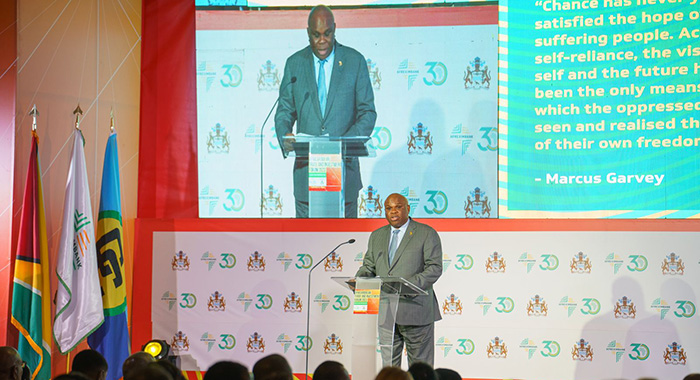GEORGETOWN, Guyana (CMC) – The two-day AfriCaribbean Trade and Investment Forum (ACTIF23) began here on Monday with a senior official of the African Export-Import Bank (Afreximbank) urging regional countries despite the programme over the past year, to continue to ensure the further development of the two regions.
Addressing the opening of the event, Afreximbank President and Chairman of the Board of Directors, Professor Benedict O. Oramah, said that it was important that the delegates leave Guyana with concrete projects for the socio-economic development of Africa and the Caribbean.
He said it is necessary to do so since it will be “determined action and not chance or handouts from elsewhere can grant us the economic emancipation and dignity we deserve as a people.
“We gather here in the land of many waters buoyed by that conviction to re-energise and re-invigorate the movement we collectively started a year ago in Barbados,” he added.
ACTIF23 is being hosted by the Guyana government in collaboration with the Afreximbank and Oramah said during the first edition in Barbados last year he had urged delegates then to help reverse the atrocities committed more than 400 years ago during the slave trade, so that at the end of the forum “our two regions would have forged an unbreakable and ever lasting bond that opens direct links” between the two regions.
“We want to leave here with actionable proposals and to open air and sea links between the Caribbean and Africa. We want to leave here with concrete plans to open banking and payment links, seal joint ventures for industrial projects, deepen commercial collaboration in the creative and cultural space including to protect…our intercultural properties.”
He said that the conference should allow for African and Caribbean investors to take advantage of the US$27 trillion North and Latin American markets, saying there must also be collaboration in the healthcare space”.
Oramah said one year later, the vision could not have been better defined.
“We must be proud that in just one year we have made significant progress in pursuit of our shared aspirations. We have worked very hard to fulfil our promises to each other like true brothers and sisters.”
He said initiatives have been advanced “sometimes at great costs to ourselves … because we have a razor sharp focus on the bigger picture, the ultimate goal of restoring dignity, respect and control of our destiny to ourselves”.
The Afreximbank senior official said he remains confident “that success awaits us” as a result of all stakeholders believing in the projects.
He told the audience that in just under one year, 12 of the 15-member CARICOM countries have signed a partnership treaty that has gone into effect in “months and not years.
He said that this paved the way for many ground-breaking achievements for rapid success, including the bank approving a lending limit of US$1.5 billion to CARICOM “with the promise of the limit to rise to three billion US dollars when all CARICOM member states join the partnership”.
He said in addition the bank has led more than five missions to the region, covering most of the countries that have signed the original partnership treaty.
“This led to over two billion US dollars in pipeline deals across the CARICOM. As a result principal transactions have been approved at final stages of conclusion. For Guyana, we have agreed to conclude a US$500 million transaction to support accelerated development projects of the Guyanese government.”
Oramah said the bank has also approved projects for Barbados, in support of its tourism revitalisation programme, St. Lucia for climate adaptation intervention, the Bahamas for small medium enterprise (SME) development, tourism projects in Grenada and for renewable energy projects and trade finance in St. Kitts-Nevis.
He said the bank’s promotion drive has also attracted African interest in fisheries, renewable energy, sports, industrial parks, commercial institutions and tourism among other projects.
He said during the two-day event here agreements will be signed including a framework agreement being signed between a Nigerian bank and a subsidiary of Afreximbank “to jointly invest in the financial services sector here in Guyana and across the Caribbean”.
He said he also expects that the agreement reached with the government of Guyana for the half a billion dollar project to be signed”.
He said a payments and settlement programme with an African bank has been selected to run a pilot programme for CARICOM central banks, adding “we hope that very soon they payments systems for Africa and CARICOM will be integrated…”
Oramah recalled that he had addressed regional leaders earlier this year on assisting the region in establishing a CARICOM Import-Export bank of which his bank would be a shareholder “if invited to.
“We have delivered on the Caribbean office and hope our collective efforts can be expedited to create the CARICOM-EXIM bank,” he said, adding that his bank has been given full approval to fund a feasibility study on that matter.
He said if the bank becomes a reality, he board is prepared to seek nearly 50 per cent in the new financial institution, if invited to participate.
“As we look ahead …despite the lightning speed of delivery, the journey remains rough and difficult. The uncertainties of the global environment, the climate conundrum, high global interest rates and the political tensions across the globe present numerous challenges to our journey.
”But we must persevere … mindful of the path we have chosen is the shock absorber we need at this time,” he said, urging regional countries to participate in the third edition of the African Trade Fair to be held in Egypt from November 9-15 this year.
“An important component of the fair is the diaspora day. We hope you can join us as the platform opens an important opportunity to expose the Caribbean to Africa and Africa to the Caribbean,” he added.






